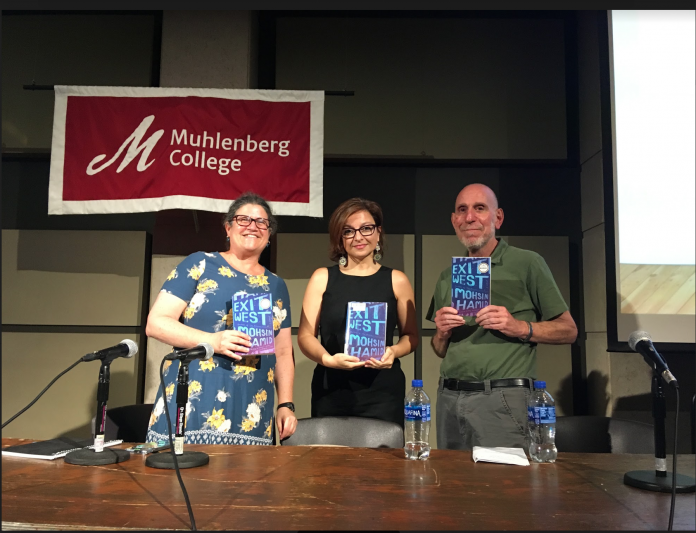
The Center for Ethics held its opening event of this year’s program: Borders, Nationalisms, Identities: The Ethics of Global Citizenship, on Tuesday, Sept. 3, in Miller Forum, Moyer Hall. The event, “Exit West – An Invitation to the Conversation,” featured a panel of three Muhlenberg faculty members, each of whom presented his or her reflections on Mohsin Hamid’s novel, Exit West. Following these presentations, the campus community had the opportunity to ask questions of the panelists regarding the novel, the Center for Ethics’ theme and the interrelationships between the two.
Miller Forum was packed with members of the class of 2023 (who had read Exit West as their required reading over the summer and were looking to further the conversation in their First Year Seminar courses), upperclassmen, professors and other community members.
Dr. Brian Mello, the Director of the Center for Ethics and an associate professor in the Political Science department, delivered the opening address for the evening. After giving an overview of the themes of this year’s Center for Ethics — borders, nationalisms and identities — Mello introduced Dr. Mark Stein, Program Director and associate professor in the History department, and Dr. Kassandra Hartford, Program Director and an assistant professor in the Music department.
Stein provided some background information on Hamid and linked the book to the program, saying, “The themes of Exit West echo the themes of the Center for Ethics program this year.”
Hartford introduced the three panelists: Sharon Albert, a senior lecturer in Religion Studies; Dr. Ioanna Chatzidimitriou, an assistant professor of French and the Director of the French and Francophone Studies Program; and Dr. Jim Bloom, Professor of English and American Studies.
Chatzidimitriou began the panelist discussion by discussing the years leading up to Hamid’s publication of the novel, focusing mainly on the summer of 2015, when the drowned body of a Syrian toddler, Alan Kurdi, made global headlines. “Immigration, nationalism and identity were at the heart of debates in Europe that summer,” said Chatzidimitriou, “and all three are in the novel.”
Chatzidimitriou went on to express her thoughts on how fiction can show reality, questioning whether or not the doors in the novel that the characters use to travel are magical elements and whether or not the reader enters a magical world with the characters. “I would argue that the doors are hyperrealistic symbols of the immigrant experience,” said Chatzidimitriou.
After Chatzidimitriou finished, Albert began her discussion by explaining the nature of borders and boundaries themselves. She then quickly delved into analyzing specific portions of the novel’s text, inviting the audience to follow along with her.
After the noise of bookbags being unzipped had subsided, Albert continued, pointing to sections where Nadia, a character in the novel, uses her clothing as a personal boundary against the world.
Albert also touched upon the relationship between religion and boundaries in “Exit West,” questioning, “What happens when our boundaries break down or don’t exist?”
Moving to stand behind the podium and access his PowerPoint presentation, Bloom began his discussion by sharing that he had elected to go last, as he “wanted to learn more about what my colleagues presented,” before he gave his own presentation.
The panelists were very interested in what the others had to say; throughout the panel discussion, the two panelists not presenting jotted down notes as their colleague presented, demonstrating their continued interest in the novel and its relation to borders, nationalisms and identities.
“Hamid set out to change the conversation,” said Bloom, “Exit West changed the way we think about the conditions the novel represents.”
Ashling Wahner ‘21 weighed in on the event, saying, “I think the panelists did a great job of putting the book into a wider world scope and connecting it to things that are happening not just in the semi-fictional, semi-magical realism settings of the book, but everywhere. The panelists did a great job connecting the book to what is happening in the United States and European countries as well and broadening the conversation.”
In the second portion of the evening, the audience was invited to ask questions of the panelists. One student asked, “Do you think there will ever be a change in immigration policy?” The consensus from the panelists was that they were not happy with the current immigration policies but did not see an immediate change.
Another question was asked regarding the doors in the novel and whether “their instantaneity took away from the experience of limbo that exists in most immigrants’ stories.”
“Sharon, you’re religion studies, so you do limbo,” said Bloom, eliciting laughter from the audience.
Albert said that the immigrant experience is waiting around for a while and then enduring abrupt movement.
Chatzidimitriou was quick to respond following Albert, saying that she actually had an issue with the idea of limbo, that it “put refugees in an object position” and that while waiting refugees are “not sitting around doing nothing. They are building communities and valuable connections. The premise of the question is problematic. It is much more than waiting.”
The panelists were also asked what they considered “the function of this kind of writing, at this time” to be.
“Watching the news in 2015 and seeing a capsized boat every couple of days,” Chatzidimitriou said, “people became numb. The reader is exposed to this, but from a different perspective. There is a danger of being lost in escapism, but there is also potential.”
Albert commented on this, saying that, while reading the novel, “She found my complacency jarring throughout the book. I would be reading and then a few sentences would remind me of ‘wow, this is hell.’”
As Bloom said during his portion of the panel discussion, “As global citizens, we are all inside the same conversation.”
The next Center for Ethics event, Ronny Quevedo – Art Gallery Exhibit & Talk, Exhibit Opening, will be held on Wednesday, Sept. 18, in the Martin Art Gallery in the Baker Center for the Arts.





















